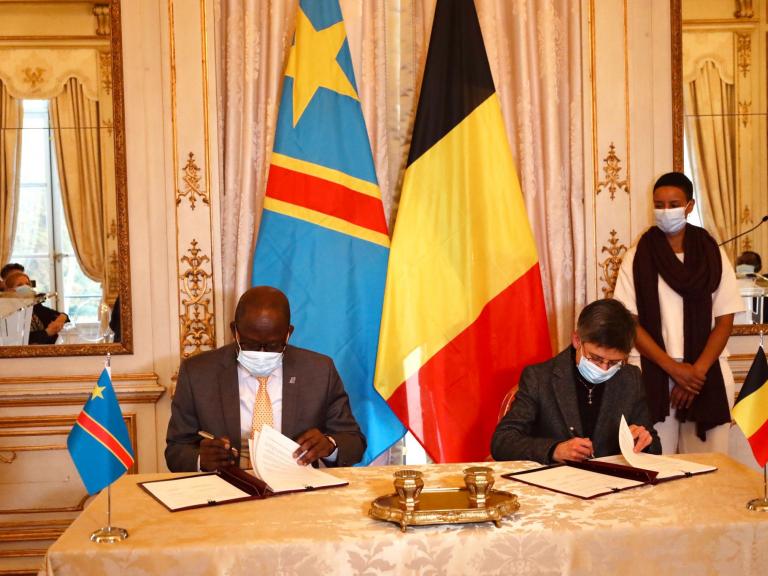-
Last updated on
Collage of documents from files of the African Personnel Service. © State Archives
During the colonial period, Belgian colonials had relationships with African women. These relationships varied in nature and duration, but many children were born from them. The fathers often left these children to their fate.
The fathers of these mixed-race, or "metis" children were clearly not only officials from the Belgian colonial administration. Some worked in the private sector: mining, plantations, etc. The then Belgian Congo and Ruanda-Urundi was also home to a large international community. As such, many metis children had Portuguese, Lebanese, Greek and Italian fathers, among others. Finally, metis children were also born from relationships between white women and black men, but this was limited to a small minority.
Living between 2 worlds
At first, the government was unsure what to do with these metis - at the time referred to as "mulattos" - because they fell outside the usual categories of "white" and "black". As recently as the late 19th century, metis children who had been abandoned by their white parent were sent to institutions, often Catholic or Protestant missions. These were sometimes thousands of miles away from their birthplace and family.
As the African wave of independence gained momentum in the late 1950s, more and more metis were brought to Belgium and the "North". Here they ended up in institutions or with foster and adoptive families. Various documents show that some mothers did actually resist the forced resettlement of their child.
This brutal separation from their roots caused great suffering among metis children. They were literally torn between 2 worlds. Many of them struggled to form their identities.

Satisfied metis after the Senate hearing where the Catholic Church apologized (25 April 2017). © State Archives
Gaining momentum after 2015
Metis individuals have long been involved in their struggle for recognition. Back in the 1950s, interest groups for and by people of mixed descent were set up, both in Belgium and in the colonial territories. Nonetheless, it was not until 2015, with the creation of the 'Metissen van België/Métis de Belgique' association, that their struggle for recognition started to gain momentum.
An apology was made by the Flemish government in 2015. In 2017, the Senate and the Walloon and Brussels Parliaments of the French-speaking community also expressed their recognition. At a session of the Senate on 25 April 2017, the Catholic Church issued an apology.
On 29 March 2018, the Federal Parliament unanimously passed the "Resolutie-Metissen" (Metis Resolution). The following year, Prime Minister Charles Michel issued formal apologies on behalf of the federal government for the suffering and injustice suffered by people of mixed descent, born during the colonial period in Central Africa.
Metis Resolution
The full title of the "Metis Resolution" is the "Resolution on the segregation suffered by the metis of Belgian colonisation in Africa". It asks the federal government to take certain measures, including a historical study into the segregation of metis during the Belgian colonial period.
FPS Foreign Affairs is coordinating the implementation of the resolution. Together with the State Archives, our FPS is in charge of the first phase of the research project, for which it is also providing the funding (€400,000). The aim is to collect as much data as possible on the individual and collective paths taken by metis. All interested parties will be able to access the archives concerning them. That way, they can reconstruct the paths their lives took, and their family history.
This first phase started on 1 September 2019, for a period of 4 years. The team of 2 scientific researchers has since identified over 2000 individual and general files from 9.5km of 'African archives'. All the relevant data are being entered into a database. A website serves as a communication site for the public and the interested parties, and also presents a virtual exhibition.

A small part of the 9.5 km of African archives, especially the individual files of the 'Association Pour la Protection/Promotion des Mulâtres' (APPM). © State Archive
Historical study
In the subsequent phase (also lasting 4 years), the role of various Belgian authorities in the treatment of metis in the colonial period will be explored: at the political, administrative, legal and also religious level. Efforts will also be made to understand the cognitive framework that gave rise to the forced separations. In this regard, the researchers will also look at how other former colonial powers, such as the United Kingdom, France and the Netherlands, treated individuals of mixed descent. The research should lead to the publication of an overarching study. The results will be presented in the Federal Parliament.
This second phase is now ready to start. To this end, a cooperation agreement was recently concluded between our FPS (FPS Foreign Affairs, Foreign Trade and Development Cooperation) and the State Archives, which falls under the Federal Science Policy. Our FPS is contributing €740,000 - including €440,000 from Foreign Affairs and €300,000 from Development Cooperation - and Science Policy €780,000. 4 scientists and 1 technician will work on the study.
Closely supervised
Both areas of the research project will be closely supervised. A strategic committee - with representatives from our FPS, the State Archives and the policy units involved - will oversee the general progression of the study. A scientific committee - made up of scientists from various disciplines - will advise on the best way to approach the research project. Finally, a steering committee will form the link with the metis and their interested parties. In addition to representatives from the metis associations, it will also include staff from our FPS and the State Archives.
'With the launch of the second phase of the research project, we are responding to the legitimate appeal of metis people born in the context of colonization,' explained Minister for Foreign Affairs Sophie Wilmès in the press release.
'Because what happened to these people and their families in the past is hugely unjust,' added Development Minister Meryame Kitir. 'They have a right to the truth. With this project, we want to help restore family ties and make sure everyone has a view of exactly what happened. I hope this initiative can provide them some support for this endeavour'.
‘I am convinced that this second phase of the project will contribute to a better knowledge and recognition of a painful and unknown part of colonial and post-colonial history’, explained State Secretary in charge of Scientific Policy Thomas Dermine;
More on People

EUROPALIA: how art connects people and communities
The EUROPALIA biennial is to host dozens more artistic and socio-cultural events until May 2022. The theme this time is trains a...
Belgian street art in Mumbai
Our Consulate General in Mumbai (India) is introducing Indians to some impressive Belgian street art.

The Institute of Tropical Medicine strengthens cooperation with the DR Congo
On 20 October 2021, the Belgian Institute of Tropical Medicine (ITM) signed a headquarters agreement with the Congolese governme...
